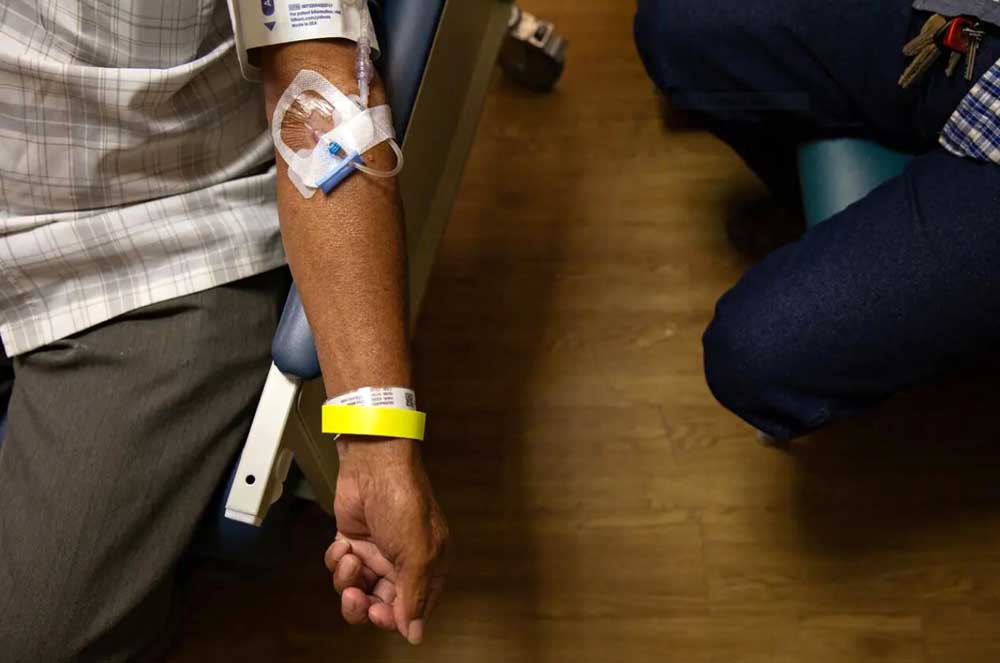Monoclonal antibody treatments sparse in East Texas as facilities await shipments
Published 5:45 am Tuesday, January 4, 2022

- Isidro Bernardino receives a COVID-19 antibody infusion in August at Titus Regional Medical Center in Mount Pleasant.
Amid a nationwide shortage of monoclonal antibody treatments, East Texas facilities are awaiting arrival of those treatments thanks to a federal allocation.
The U.S. Department of Health and Human Services (HHS) announced shipments of sotrovimab, the monoclonal antibody treatment effective against the omicron variant, to resume this week. It will deliver 55,000 doses, plus an additional 300,000 doses of sotrovimab are expected to be available for distribution this month.
Trending
Last Wednesday, the HHS and the Assistant Secretary for Preparedness and Response (ASPR) announced the pause of further allocations of select monoclonal antibody treatments in areas of the country where the omicron variant has an 80% prevalence. Officials stated sotrovimab was the only treatment to be administered, but the decision was retracted just before the New Year’s weekend. On Friday, the group said other treatments could be administered but reiterated they are not effective against omicron.
“If the Delta (Variant of Concern) still represents a significant proportion of infections in a region and other options are not available or are contraindicated, eligible patients can be offered bamlanivimab plus etesevimab or casirivimab plus imdevimab, with the understanding that these treatments would be ineffective if the patients are infected with the Omicron VOC,” HHS said in a news release on Friday. “This concern can be mitigated if virus-specific diagnostic testing in a given patient indicates infection with the Omicron VOC is unlikely.”
Dr. Tom Cummins, Division Chief Medical Officer for UT Health East Texas, said the pause was due to the therapies not being effective against the omicron variant. He added though, that he believes East Texas has already reached that 80% of omicron prevalence.
Cummins explained there may have been backlash because of the HHS’ pause of the distribution in areas where the delta variant, still classified as a variant of concern, is still prevalent, even though the therapies are ineffective.
At UT Health East Texas’ Regional Infusion Center, located at the UT Health East Texas North Campus in Tyler, there are no sotrovimab monoclonal antibody treatments available, Cummins said, but the treatment has been requested.
“We don’t have any of the sotrovimab. Most of our facilities that were infusing are now out of the others (treatments) as well. We may have a few doses at the North Campus facility, but we really sort of stopped distributing it because of the efficacy against the omicron variant,” Cummins said.
Trending
As of Monday, most of the facilities that offered monoclonal antibody treatments in East Texas do not have any available to give, including Red River Vital Care of Tyler, Exceptional Emergency Center and Genoa Healthcare.
According to the Texas Department of State Health Services’ map of monoclonal antibody treatments, on Dec. 31, there were 35 patient courses of the sotrovimab monoclonal antibody treatment available at Christus Mother Frances Hospital in Tyler. Since then, the count has not been updated.
Hospitality Health ER in Tyler had five patient courses available as of Tuesday morning.
In Longview, as of Monday there was a very limited supply of the sotrovimab treatment at Hospitality ER, only available for critical and high-risk patients, a representative from the clinic said. No other facilities in the area had the treatment as of Tuesday, according to the state website.
Patients are asked to contact a respective facility to confirm availability. With facilities awaiting shipments this month, the availability remains fluid.
According to the Public Health Emergency division of the HHS, between Jan. 3 to Jan. 9, Texas is expected to receive 11,376 total allocations of monoclonal antibody treatments, 2,406 of those will be sotrovimab.
There are other treatments available that remain effective against the omicron variant for those in need, including the oral COVID-19 antiviral medication, which is now available locally in limited quantities with a prescription while supplies last. Cummins said this is only recommended for use in people who are at high risk of severe illness.
Monoclonal antibody treatments have historically had an impact in hospitalization rates and local emergency room visits, but the lack of treatment now may not be as much of a problem just yet.
“If the virus does here what it has done in other countries, which is, have a really high, rapid rate and escalation in number of people infected, but the mass majority of them having a very mild infection and a very rapid decrease in the number of cases again, if that happens, then no, the lack of sotrovimab is not a big issue,” Cummins said, and added that if it persists, it may become a problem.
While some facilities across the state are seeing high hospitalization rates, Cummins said several people are testing positive in the UT Health system, but although hospital numbers have risen, they have yet to reach hospitalization levels historically seen with other variants, including delta.
“With the level of positivity we’re seeing, I would’ve expected a lot more people being hospitalized and critically ill, whereas we have a very small number on the ventilator, and while our numbers are rising, they aren’t rising at the same rate as the positive rate,” Cummins said.
At UT Health East Texas’ Tyler facilities, there were 18 COVID patients hospitalized and seven are on ventilators as of Monday. There were a total of 56 patients hospitalized for COVID across the division with 10 on a ventilator.
At Longview Regional Hospital there were 13 COVID-19 patients hospitalized as of Monday, according to hospital officials.
“This is kind of what I expected to see, based on what we were hearing about omicron from other countries, other places. The original reports was that it caused a milder symptom complex, so if that were the whole truth, you would expect lower numbers in the hospital, lower numbers on the ventilator, and so far, that’s what we’re seeing,” Cummins said.
He added a different variant could take hold and get into a much more vulnerable population, but so far, it’s what he expected to see.
Cummins said 90% of those hospitalized are not vaccinated against COVID-19. There have been breakthrough cases in some fully vaccinated and boosted, he said. Those hospitalized range in age from the mid-30s to upper 80s.
Eligible COVID-19 patients will need a form filled out by their doctor, which will act as a prescription for the infusion. To ensure the facility is utilized for patients who meet the treatment qualification standards for this type of treatment, a referral is required and walk-in patients cannot be seen. If you do not have a general practitioner, call the UT Health infusion center at 903-877-7119 for more information.





